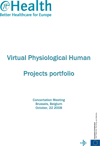Article of the Month!
 This resource book provides an overview of the set of Virtual Physiological Human (VPH) research projects managed by the ICT for Health unit of the Information Society and Media General Directorate, which are funded under the Sixth and Seventh framework Programme for Research and Development. At the core of the VPH lies the idea of translating all functions of the human body into a coherent set of multi-scale computer models.
This resource book provides an overview of the set of Virtual Physiological Human (VPH) research projects managed by the ICT for Health unit of the Information Society and Media General Directorate, which are funded under the Sixth and Seventh framework Programme for Research and Development. At the core of the VPH lies the idea of translating all functions of the human body into a coherent set of multi-scale computer models. The VPH framework will provide ICT tools for developing patientspecific computer based models and simulations using specific patient data allowing for personalised and predictive healthcare. These multi-scale models will be used to develop an integrative approach to predicting the risk in developing a disease and to improving the diagnosis and treatments of these diseases. During drug development, such organs models could be used to assess the drug effect on a specific population.
The Virtual Physiological Human will revolutionise the way health knowledge is produced, stored and managed as well as the way in which healthcare is currently delivered. Results will include personalised disease predictions, earlier diagnoses, better surgery planning and training, and a better understanding of the links between genes, diseases and treatments. The use of predictive models will significantly improve diagnosis, treatment and monitoring of patients, and the success of the VPH challenge will have an impact on the way health knowledge is understood, formalised, represented, communicated with regards to both healthcare and economy. The area attracts not only the medical informatics, bioinformatics and biomedical engineering communities, but also capable of generating significant interest from the large pharmaceutical industries as well as the small and medium sized biotechnology companies.
Download Virtual Physiological Human Projects Portfolio (.pdf, 6.352 KB).
Download from the eHealthNews.EU Portal's mirror: Virtual Physiological Human Projects Portfolio (.pdf, 6.352 KB).
Related articles:
For further information:
ICT for Health
European Commission - Information society and Media DG
Office: BU31 06/73 B-1049 Brussels
Tel: +32 2 296 41 94
Fax: +32 2 296 01 81
http://europa.eu/information_society/eHealth